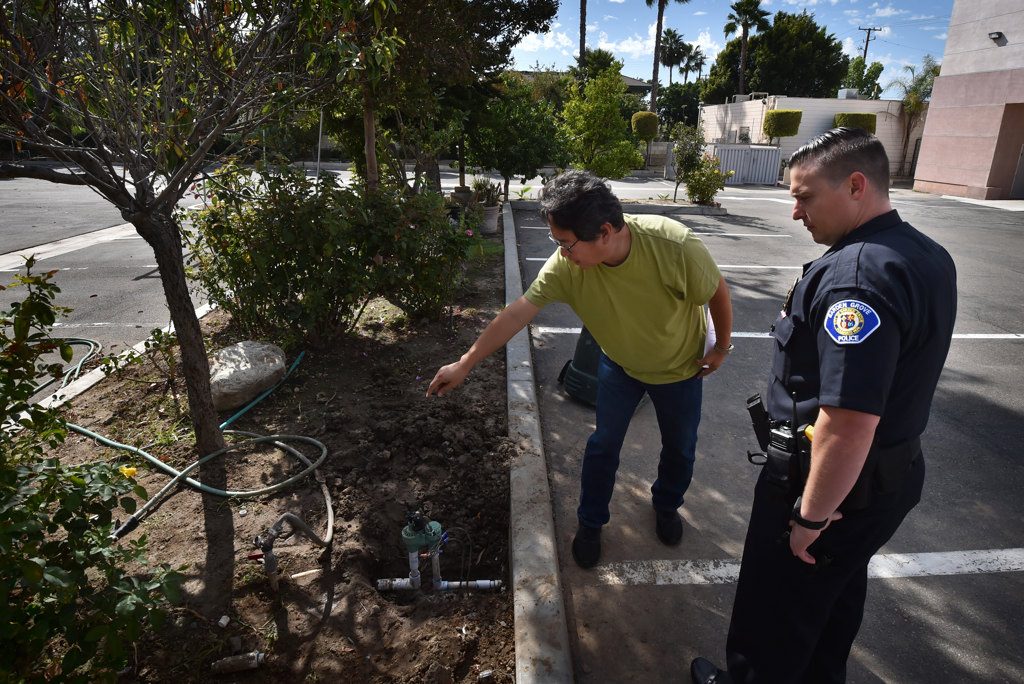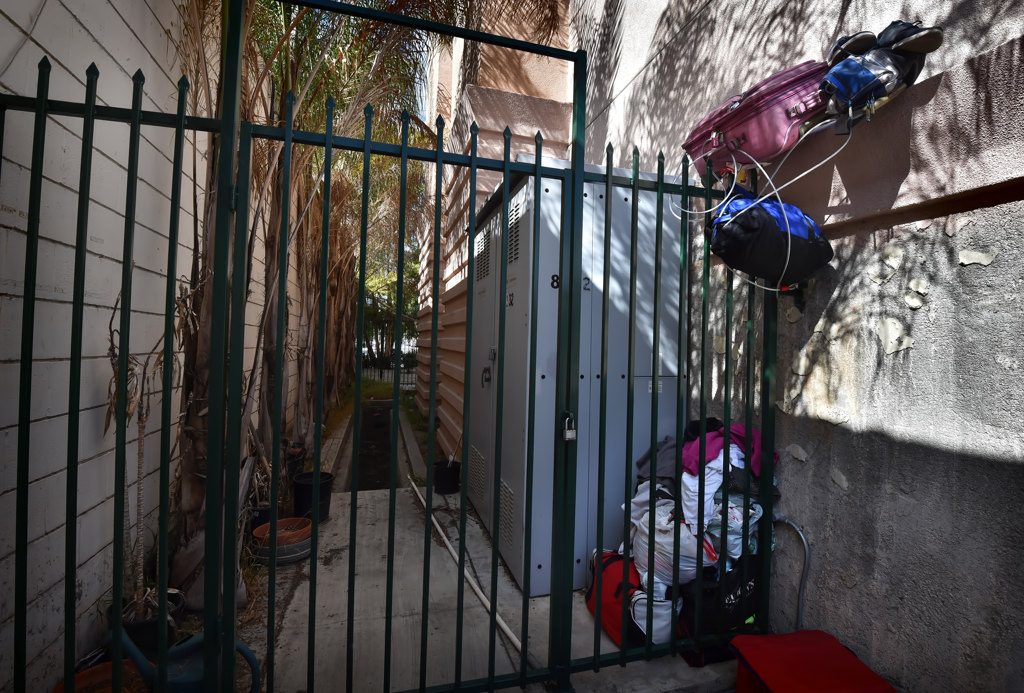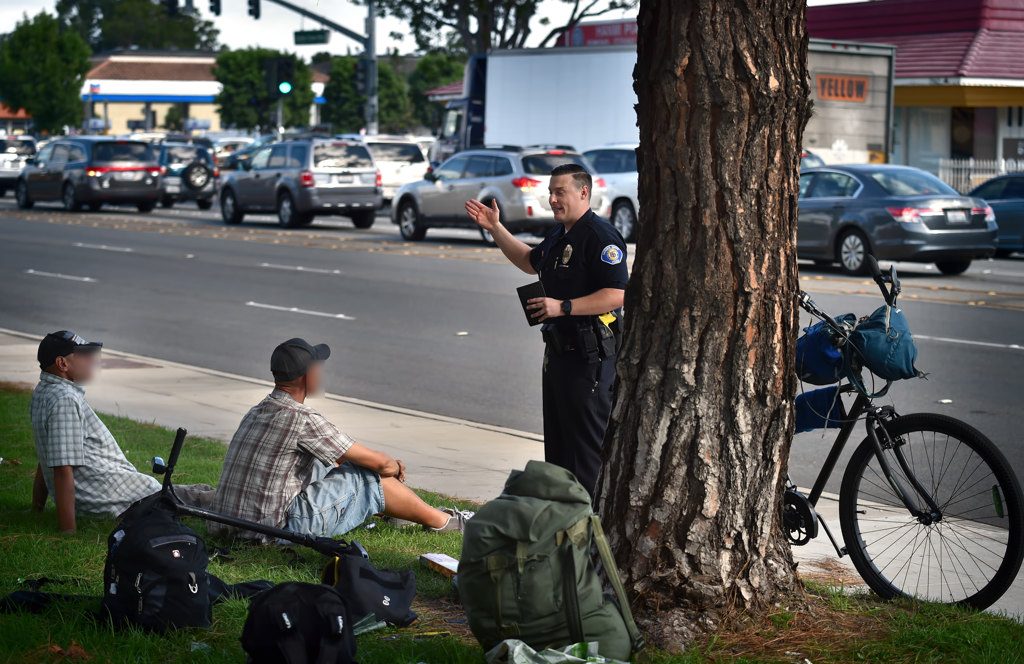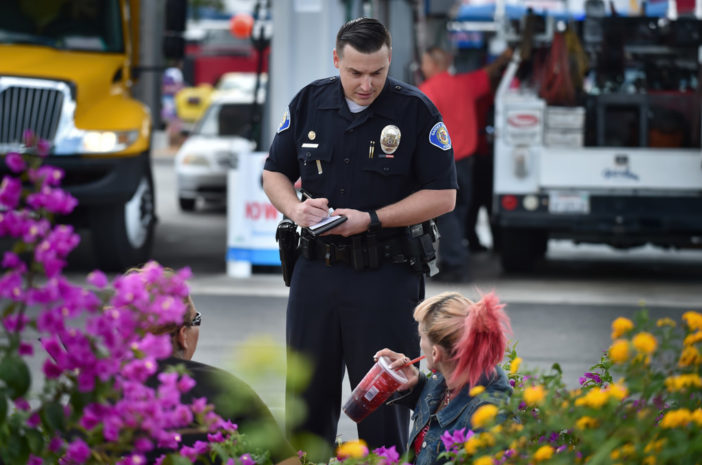The two women had found some shade under a tree to escape the hot afternoon sun.
Appearing to be homeless, their belongings in suitcases, they sipped sodas and ate Oreos while sitting in a large, wood chip-filled planter decorated with purple bougainvillea and other plants.
Problem was, the women were on private property: a Chevron gas station at Beach and Garden Grove Boulevards.
Garden Grove PD Officer Mitchel Mosser walked up to the women and gave them a warning about loitering.
“You’re going to have to gather your stuff and go,” he told them after confirming they didn’t work at the gas station.

Senior Pastor Won Lee of the Gospel First Korean Baptist Church in Garden Grove shows Officer Mitchel Mosser where water pipes were broken into by homeless people behind the church in order to shower.
Photo by Steven Georges/Behind the Badge OC
He took down their personal information on a Field Interview card, which police use to keep track of contacts they make during a shift. The women, who appeared to be in their 30s, had no record with the GGPD, he noted.
Mosser pointed out some trash in the planter as the women got up to relocate to a bus stop.
The mostly commercial area, dotted with a couple of cheap motels, a landmark bar catering to the LGBT community, a liquor store, a fast-food joint and other businesses, and surrounded by homes in Garden Grove, Westminster and Stanton, long has been a magnet for crime, GGPD officials said.
But a recent rise in complaints led the GGPD to adopt a “crime triangle” strategy that resulted in two directed enforcement efforts, the first in December 2016-January 2017, and a just-ended one.
For two weeks through Sept. 14, Mosser headed up a directed enforcement effort in response to numerous complaints, mostly from businesses including Chevron, about increasing incidents of vandalism, loitering, trespassing, littering and other non-violent offenses, although the area also has seen a couple of armed robberies in the past six months, with victims having purses ripped out of their hands.

Locked backpacks and other bags of stuff believed to belong to some homeless people were found behind locked gates of the Gospel First Korean Baptist Church in Garden Grove.
Photo by Steven Georges/Behind the Badge OC
Mosser said the special enforcement details were not undertaken to specifically target the homeless, but all law-breakers. The crimes cause quality-of-life issues to the residents and businesses of Garden Grove, he said.
The two crackdowns occurred along a half-mile stretch of Garden Grove Boulevard east and west of Beach Boulevard, and about 100 yards north and south of Garden Grove Boulevard on Beach Boulevard. And it yielded lots of arrests and tickets.
Between Sept. 1 and Sept. 14, GGPD officers made 75 arrests and handed out 51 citations in the area, Mosser said. The most serious arrests involved drug sales and people with outstanding warrants.
“We’re taking a zero-tolerance approach,” Mosser said on a ridealong last week, two days before the special enforcement effort ended.
“We’re not only sending out officers to work the area, but officers on their regular patrol shifts, too.”
Every day during the recent two-week period, GGPD officers devoted about 10 hours to weeding out lawbreakers in the area, whose commercial tenants include a Hospitality Inn, the Morada Inn, the Frat House bar, a Taco Bell, AquaZoom Car Wash, two piano stores and a Korean church.

Garden Grove PD Officer Mitchel Mosser tells two homeless men they cannot hang around in front of a piano store on Garden Grove Boulevard.
Photo by Steven Georges/Behind the Badge OC
Won Lee, senior pastor at the Gospel First Korean Baptist Church, located next to the Frat House, had called the GGPD to complain about people sleeping in front of church.
On one side of the church, suitcases and other items, presumably owned by a transient or transients, were stacked against the church.
And a sprinkler system had been broken by someone apparently wanting to use the water line to shower. The same thing had happened just weeks earlier, Lee said.
“As a church, we want to welcome all into our doors, but at the same time, we’re not a motel,” Lee told Mosser. “There’s a line we have to draw.”
Mosser suggested that Lee put up signs declaring the church a dump-free zone.
He asked that Lee supply to the GGPD a key so officers could access the gated parking lot behind the church after hours.
And Mosser asked Lee to sign a “trespass letter,” which would allow the GGPD to access the private property to make arrests or ask individuals to leave the property in the event that Lee and other church officials weren’t immediately available.
“The police officers (in Garden Grove) are fantastic,” Lee told Behind the Badge. “This is a quality-of-life issue. You shouldn’t have to fear seeing strangers parked in a car in front of your house or people sleeping on your property.”

Garden Grove PD Officer Mitchel Mosser talks about directed enforcement efforts around Beach and Garden Grove Boulevards.
Photo by Steven Georges/Behind the Badge OC
At 2 p.m. on Sept. 12, Mosser came in on his day off — his regular shift is graveyard Thur.-Sat. — to work part of a swing shift. Two other officers, Nick Almeida and Michael Gerdin, patrolled the problem area beginning at 5 p.m.
After sending the two women packing, Mosser stepped into the Taco Bell to see if a manager, who had complained about loitering and vandalism, was there.
He wasn’t.
Taco Bell is one of a few businesses in the area that don’t stay open all night, making it vulnerable to loiterers. Mosser wants to talk to the Taco Bell manager and get him to sign a trespass letter.
A few minutes later, Mosser spotted a man standing on a median on Beach Boulevard, just north of Garden Grove Boulevard. He told the panhandler it wasn’t safe to stand where he was and ordered him to leave.
“Some panhandlers can make between $80 and $100 a day,” Mosser noted. “About $60 covers a night in a motel, and the rest is for food and drinks.”
Later, Mosser spotted two men on a lawn outside Kim’s Piano, on Garden Grove Boulevard just west of Beach Boulevard. Both were smoking cheap cigars and sitting next to a half-gallon of milk, a carton of Great Value Donut Sticks and a bottle of European Gold Tan Extender Moisturizer.
Mosser told the men, who turned out to be twin brothers, 49, to move along. One hopped on a bicycle, and the other put his belongings on a Razor scooter and followed him heading west down Garden Grove Boulevard.
Mosser noted that the GGPD Traffic Unit also participated in the recent two-week crackdown, with motor officers writing an eye-popping 48 citations one morning in just 90 minutes.
“I would say we’re (making a difference),” Mosser said.
He noted that calls for service during his graveyard shifts recently have plummeted because word has gotten out in the area that the GGPD means business.
“Crime, of course, will continue to be a problem,” Mosser said, “but the whole point (of these crackdowns) is to let people know, ‘Hey, we’re not going to tolerate these behaviors.’”
 Behind the Badge
Behind the Badge



